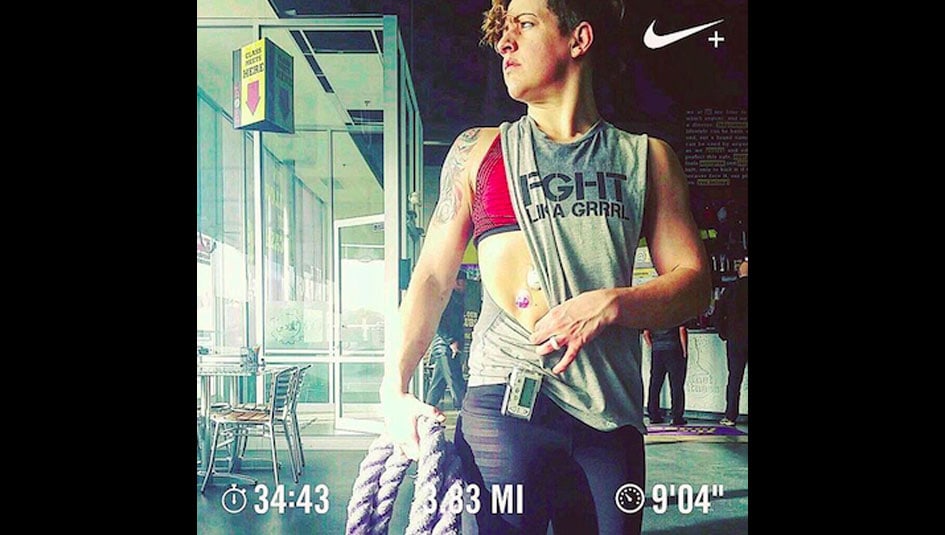MMA Fighting for a Cure

B.J. Garceau is taking the Juvenile Diabetes Research Foundation (JDRF)’s mission (“fighting for a cure”) very seriously. She will make her debut in the MMA on February 3, and the event will benefit the charity in several ways. First, all proceeds from ticket sales will be donated to the organization. Garceau will also sell merchandise (fight shirts, tanks, hoodies, and sweatpants) and donate the profits to JDRF. She has also attracted local sponsors to give to the cause.
Not to mention, Garceau tells Insulin Nation, “being the first T1D to enter the cage for New England Fights will bring awareness and attention to the disease.” She wants to send a message to younger individuals with the disease: you can still pursue your dreams.
When she was a little girl, Garceau aspired to be a martial artist. (She attributes this to all of the Jean Claude van Damme movies that she watched growing up.) But in 1993 at eleven years of age, she was diagnosed with Type 1 diabetes and told to rethink her career goals. “People thought it was too much of a health risk at the time,” she told another news outlet. She did not question this advice because it came from medical experts.
In high school, she played other sports, such as field hockey, softball, and basketball. But in college, she did not compete in any sports because her diabetes was not well managed. After graduating, she began to take her health more seriously. She got an insulin pump, and she began working out more regularly. She started attending kickboxing and other fitness classes, where she connected with others in the fighting scene. These colleagues encouraged her to attend camps and eventually to enter the ring.
Other life events also prompted her to follow this opportunity. During this time, she lost her father and grandmother. “It was kind of a reality check for me, that we can’t live forever so if I want to do some things in life I better start doing them.”
If her father were alive today, she told Insulin Nation, “he would have been so so so proud!” Her surviving family members, including her mother, are excited and nervous at the same time. “My poor mother has taken care of me growing up, so she’s not excited about the thought of me getting beat up. However, she knows me and knows I won’t back down.” Garceau says her wife is her biggest supporter. Despite a crazy work and training schedule, the two make time for dinner together every night.
She’s also grateful to her coach, team members and employers, who accommodate her work schedule. She works an overnight shift at the hospital and still manages to train 2 to 4 hours, 6 days a week. “It’s not easy, but it’s worth it,” she says. “The cool thing is MMA makes me healthier, so if I don’t get my training in my blood sugars can differ, weight can change, which also affects my mental health.”
At the gym where she trains, she is often approached by others, who see her pump or CGM and say “‘My God, I didn’t know you could do this.” Though she relies heavily on both devices, she won’t wear either during the fight. She will simply test 20 minutes before and after the fight, as she has done in previous jiu-jitsu competitions. She adds, “Hopefully, I can finish [my opponent] off fairly early.”
Garceau will enter the cage with Jepha Mooi of Tampa, Florida during a New England Fights show at the Androscoggin Bank Colisée in Lewiston, Maine. She was previously scheduled to fight in other MMA events, but, in these instances, her opponents withdrew.
Prepping for such an event will be tricky. Unlike other fighters, she can’t simply assume an extreme diet a week or two before the fight. So, she plans to increase her running and be very conscientious with food choices. She will need to drop 10 to 15 pounds to fight at the 115-pound limit.
Garceau admits that sometimes diabetes interferes with her training and fighting. When asked if she’s ever had to sit out because of a low or high blood sugar, she told us, “Yes!! I have had that happen on more than one occasion. I always carry something on me to bring [my blood sugar] up in the gym, sit and watch/cheer my teammates while they still work out.”
This training is onerous, to be sure, but it gives meaning to her life. “It makes me feel like I have a purpose,” says Garceau. “I’m fighting for those who believe in me. I’m fighting to let people know T1D is serious BUT it won’t stop us as long as we take care of ourselves.” She’s had Type 1 diabetes for 25 years but considers herself “healthier now than ever.”
Do you have an idea you would like to write about for Insulin Nation? Send your pitch to submissions@insulinnation.com.
Thanks for reading this Insulin Nation article. Want more Type 1 news? Subscribe here.
Have Type 2 diabetes or know someone who does? Try Type 2 Nation, our sister publication.